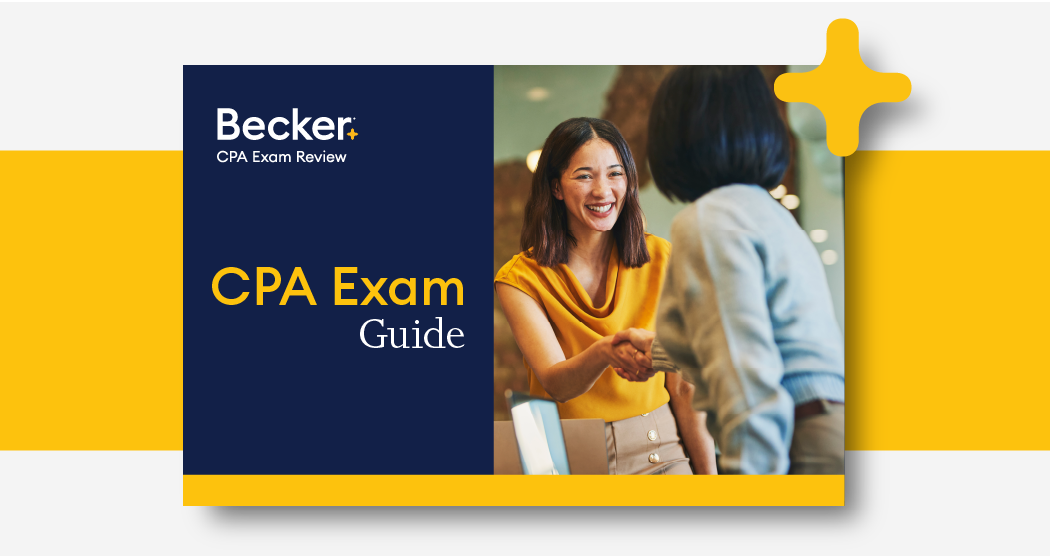
Most professional credentialing exams, such as the Bar Exam lawyers have to take, or the NCLEX for nurses, are difficult, but how hard is the CPA Exam?
The short answer is that it is very challenging, but that doesn't mean it's impossible. Far from it—tens of thousands of people pass the CPA Exam every year! To get a better understanding of what you can expect, we're going to explore CPA Exam pass rates, what makes the exam so difficult, and tips on how you can pass.
How Hard Is the CPA Exam? Understanding Pass Rates
In 2025, the pass rate for the CPA Exam was around 56%, but, because there are six sections of the exam, it makes more sense to consider the individual pass rates for each section.
- Auditing and Attestation (AUD): 48.21%
- Financial Accounting and Reporting (FAR): 42.12%
- Taxation and Regulation (REG): 63.12%
- Business Analysis and Reporting (BAR): 41.94%
- Integrated Systems and Controls (ISC): 67.79%
- Tax Compliance and Planning (TCP): 77.65%
So, when you ask, "How hard is the CPA Exam?" solely looking at pass rates as a barometer for the answer, it depends on which section you are taking. The numbers show that the hardest sections of the CPA Exam are AUD, FAR, and BAR, while REG, ISC, and TCP are easier.
But that may not be the case for you! It’s important to remember that your experience, skillset, strengths, and challenges may be different, so you shouldn’t let the overall pass rates hold you back or intimidate you. Instead, making sure you are properly prepared makes the biggest difference in whether or not you pass the exam.
What Is a Passing Score on the CPA Exam?
No matter how many multiple-choice questions and task-based simulations on each section, each one is scored on a scale of 0 to 99, and candidates need a 75 to pass. This score reflects a weighted performance on multiple-choice questions and task-based simulations rather than a simple percentage of correct answers.
If you wish to go above and beyond, you can shoot past the CPA Exam pass score and aim to earn the Elijah Watt Sells Award. Watt Sells award recipients obtain a cumulative average score above 95.50 across all 4 sections.
What Makes the CPA Exam Hard?
So now that you have an answer to the question, "How hard is the CPA Exam," the next question is, "What makes the CPA Exam so hard?"
The CPA Exam is designed to measure whether candidates have the knowledge, skills, and abilities required to succeed as licensed CPAs. Here's what contributes to its challenging reputation:
Vast Amount of Content
The exam tests topics across accounting, auditing, regulation, including both foundational concepts and more advanced topics, so each of the three Core sections and three Disciplines involve extensive content. Every section covers multiple areas that require a deep understanding and the ability to apply this knowledge in different scenarios.
Application and Analysis
It’s not enough to simply memorize concepts. The CPA Exam emphasizes critical thinking, requiring candidates to apply their knowledge through:
- Multiple-choice questions (MCQs): These often test candidates' ability to distinguish subtle differences between answer options
- Task-based simulations (TBSs): Real-world, task-oriented questions requiring hands-on analysis.
Time Constraints
Each section has a four-hour time limit consisting of both multiple-choice and simulation questions. With so much to do in so little time, effective time management is crucial.
How Can I Pass the CPA Exam?
Success on the CPA Exam comes down to preparation and strategy. Here’s how you can give yourself the best shot:
Invest in the Right CPA Review Course
Becker's CPA Exam Review can make all the difference in your exam performance by providing you everything you need to be Exam Day ReadySM.
- Comprehensive textbooks that cover topics in detail
- Over 900 concept videos taught by expert instructors who break down topics in better detail with examples and in-depth explanations
- Thousands of MCQs and TBSs that align with the AICPA's blueprint
- Unlimited personalized practice tests that focus on areas of opportunity
- Newt™ AI, an AI study tool that provides immediate answers to your questions
With tools like these, you can feel confident in your readiness to pass.
Develop a Realistic Study Plan
Becker recommends you spend between 100 and 150 hours studying for each section of the exam. To stay on track, we recommend you do the following:
- Break your preparation into manageable chunks
- Allocate at least 8–12 weeks per section
- Assign specific days for each topic.
- Use practice exams to track your progress and identify areas needing improvement.
Becker's customizable study planner makes it easy to follow and stick with a study plan that works with your schedule and learning needs, providing you with a clear path to Exam Day Readiness.
Ace Time Management
Taking Becker's simulated exams ensures you can practice pacing yourself and know what to expect when it's time for the real thing. You'll know how much time to spend on MCQs and how much to allocate towards TBSs so you don't have to worry about the clock running out.
How Hard Is the CPA Exam with Becker?
Becker Exam Day ReadySM students have a 64 percent higher pass rate than all other exam takers, showing that students who use Becker have a much higher likelihood of passing.
What Is an “Exam Day ReadySM” Student?
Becker students who complete these three guidelines are considered “Exam Day ReadySM” and prepared to pass the CPA Exam:
1. Watch 80% of the lecture videos of the section you’re preparing for
2. Correctly answer 80% of the multiple-choice questions and task-based simulations in each section
3. Earn a minimum score of 50% on the two simulated exams and three mini exams of the section
Try Becker FREE for 14 Days
If you'd like to see how Becker gets you ready to pass the CPA Exam, we make it easy with a free 14-day trial.
Featured
- https://www.aicpa-cima.com/resources/article/learn-more-about-cpa-exam-scoring-and-pass-rates










